News
Playing our Ghanaian folk games in Helsinki
Last weekend, I took part in a summer picnic organised by a Ghanaian association here in Helsinki. The picnic allowed a group of Ghanaian immigrants to be outdoors after the lockdown in Finland was eased somewhere last month. The event brought together about 30 people.
We ate and drank (no alcohol), the organisers of the picnic and those of us older ones decided that instead of playing football and running races that Ghanaian immigrant groups usually do on such occasions, we would do some traditional Ghanaian moves or folk games for a change.
Displaying “Kye Kye Kule”, “Ampe”, and “Anntoakyire”
We did “Kye Kye Kule” moves, played “Ampe”, and “Anntoakyire”. The reason for these traditional Ghanaian games/play was two-fold. First, we wanted to do exercises in which as many people as possible could take part for the fun and also to keep physically active for good health after about three months of staying home due to the lockdown that started in mid-March and was eased last month.
The second reason was that we wanted to show to the children who had been born here in Finland or who did not grow up in Ghana to have ever witnessed those Ghanaian physical activities.
I saw the kids watched with obvious delight the activities and also when they took part in the activities.
We laughed and enjoyed singing and enacting “Kye Kye Kule”: “Kye Kye Kule…Kyee Kule; Kye Kye Kofi sa…Kye Kye Kofi sa; Kofi salangan…Kofi salanga; Tatashi langa…Tatashi langa…Kum adende..kum adende”.
It was similarly with the “Anntoakyire”. “Anntoakyire…Yeeye; obi ba oo…yee yei; obeewu oo…yeeye; obi ba rebewu oo…oda ho”. I told someone that years ago in Ghana an elderly man had explained to me the etymology of “Anntoakyire”, explaining that it was originally called “Annhwewoakyire” (literally, “not to look behind you” because you do not have to look behind you to determine that an object has been placed there; you have to show smartness by guessing right).
Portraying Ghana culture to kids born in Finland
I remember some years ago, some Ghanaian immigrants taught Twi to Ghanaian kids here in Finland as well as drumming and dancing. Maybe due to work schedules and other issues teaching of such activities has died down. But we know it has to be revived.
I have written sometimes about how Ghanaian migrants in Finland live and organise their lives in everyday practices within the Finnish society and culture.
Actually, while Ghanaian immigrants in Finland make efforts to integrate into the society where they live (here in Finland), they also try to portray the culture of Ghana, their original country.
Cooking and eating certain kinds of food (or an improvisation from food combinations) are deemed typically Ghanaian (or African) is an example. Ghanaian immigrants in Finland also display Ghanaian culture during funeral events where people mostly wear Ghanaian funeral clothes and styles made with fabrics from Ghana.
Modernity, technology and our folk games
We may be losing grounds with keeping our folk games and indigenous identity due to modern technology and video games. Actually technology is driving the world very fast, and we may be helpless stopping technological advances.
All the same, we should find ways of going along with modern technology while still maintaining our indigenous practices that are worth preserving.
Mobile phones and computers have potentials if used effectively to enhance information and education although they have their own challenges, such as non-access to the devices and considerations of sedentary lifestyles and health.
Lack of exercises can lead to cardiovascular problems, even among kids, especially those who are obese as well as those with lower social bonds.
Aside this, we also need to teach the kids to appreciate what our culture offers as a way of our cultural/social capital and identity, even if it is multiple identities involving both Ghanaian and Finnish cultural values.
Dr Perpetual Crentsil
perpetual.crentsil@yahoo.com
News
Avonsige: The intersection of fashion and culture

As I speak to Avonsige Ayinemi Augustina, the visionary CEO and Creative Director of AVONSIGE, she passionately shares her journey with me.
Her voice carries both confidence and warmth, mirroring the essence of her designs yet deeply rooted in culture.
“Fashion for me, is more than just clothing,” she told me. “It is a language, a way of expressing identity, and a bridge that connects our past, present, and future. Every piece I create tells a story, and that story begins with Ghana.”
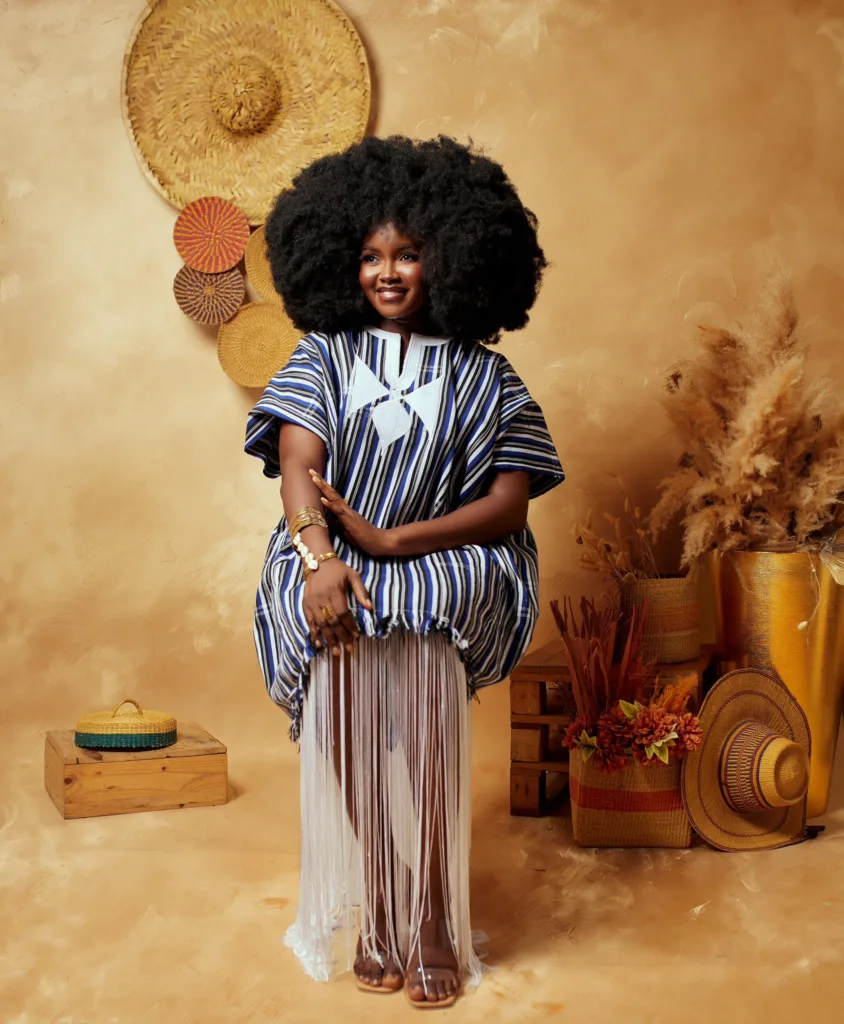
Her love affair with fashion began as a teenager when she was captivated by an avant-garde show that left an indelible mark on her creative spirit.
“I knew then that I wanted to design unforgettable pieces of garments that leave an impact long after they are worn,” she added.
Encouraged by her supportive parents, she pursued visual arts and textiles, laying the foundation for AVONSIGE, a brand that has since become synonymous with elegance, cultural appreciation, and innovation.
She explains that, AVONSIGE is not just about garments, but rather a gateway into Ghanaian culture, with a signature aesthetic that merges pristine whites with rich indigenous textiles.
Again, she said that people have to see Ghanaian smock and kente, fabric and wear them with pride, knowing that each weave carries centuries of history.
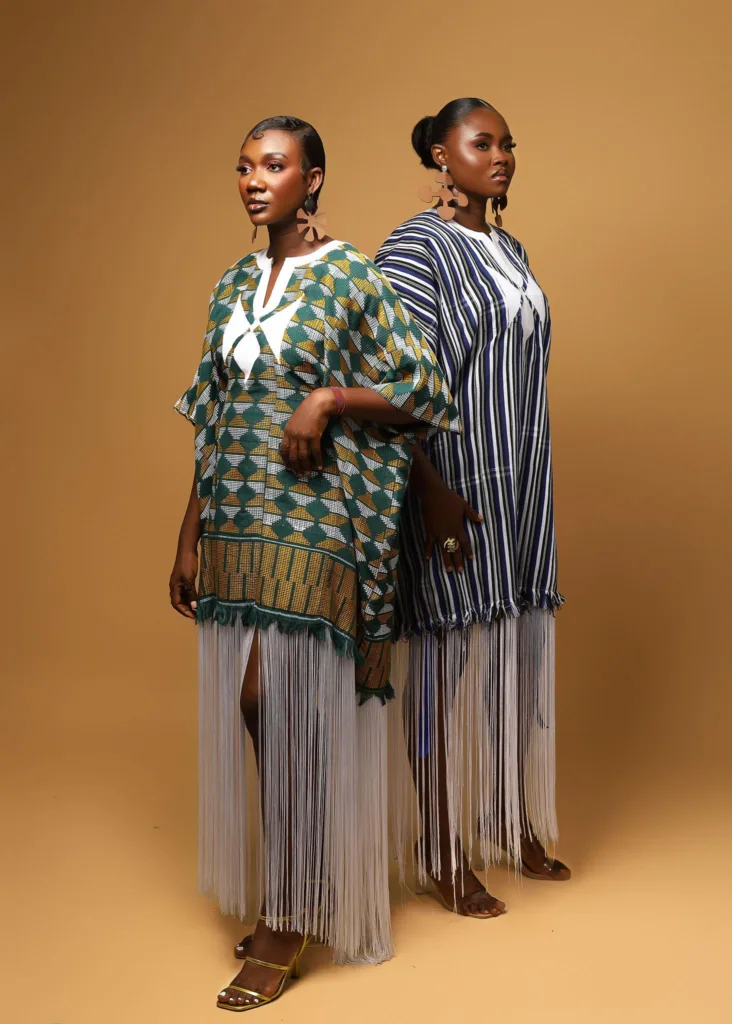
She beams as she described her mission of creating a safe space to understand and appreciate the Ghanaian lifestyle and traditions as the country celebrate Ghanaian heritage month.
Fashion should be a conversation starter, a way to carry our history with us. When you wear AVONSIGE, you are not just wearing fabric; you are wearing the soul of Ghana.”
She paused, then added, “To know our attire is to know our worth.”
Avonsige takes immense pride in sourcing authentic fabrics from the Upper East Region of Ghana. “Our styles and textiles are deeply rooted in the craftsmanship of northern Ghana,” she told me. “From the intricate handwoven smocks to the vibrant kente, each fabric carries the legacy of our ancestors, and we ensure that authenticity is preserved in every piece,” she indicated.
Avonsige’s passion for storytelling is evident in every project she undertakes. “I wanted to push beyond the runway,” she said, eyes alight with excitement.
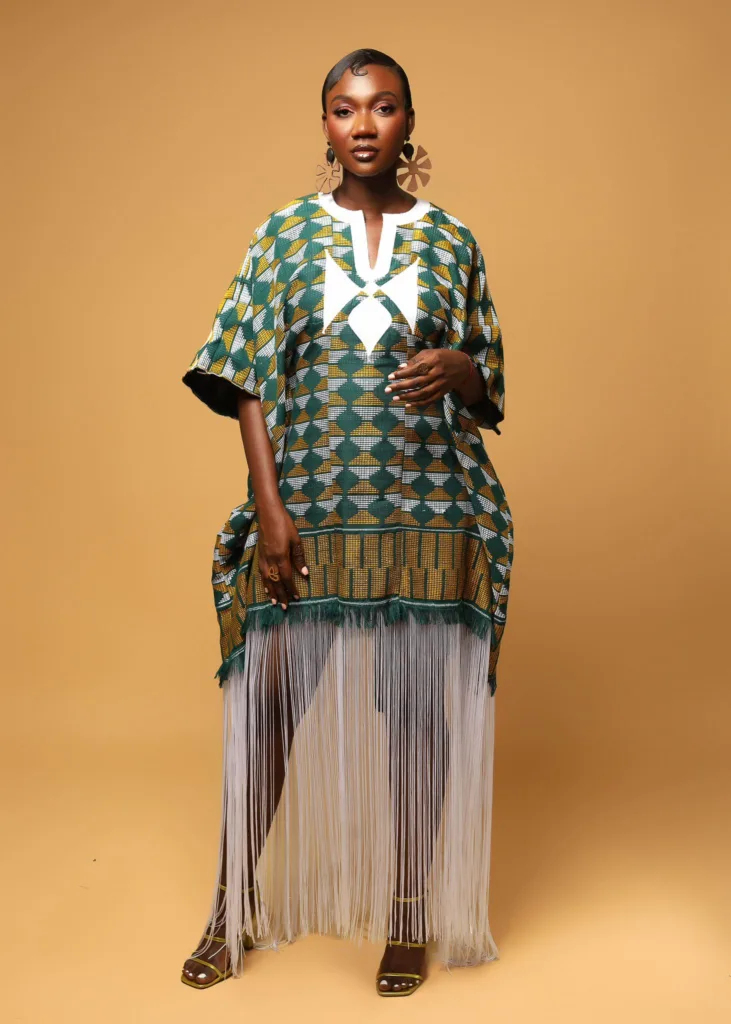
Her commitment to preserving Ghanaian narratives through fashion is unwavering. “Every stitch, every pattern has meaning,” she noted. “That’s the beauty of our craft – it is a living, breathing testament to who we are.”
Beyond luxury and aesthetics, AVONSIGE is deeply rooted in philanthropy. “Fashion should not only inspire but also uplift,” she tells me. Through her annual initiative, AVONSIGE Runway for a Cause, she recreated original designs into Christmas outfits for orphans and underprivileged children in northern Ghana.
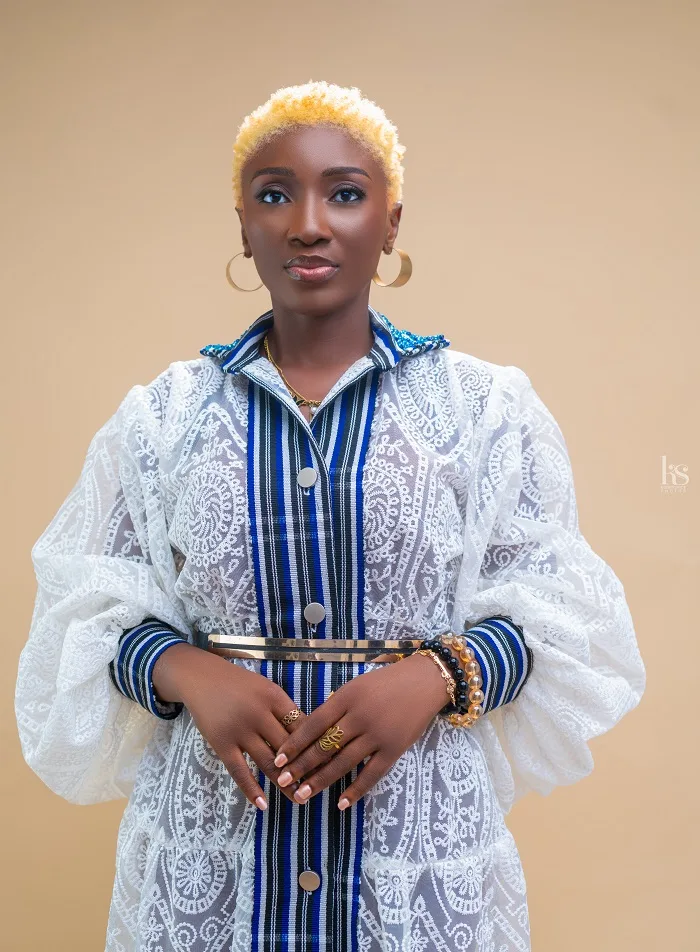
“This is something very close to my heart,” she said with a softening voice. “It is my way of giving back, of ensuring that every child feels valued and beautiful.”
As our conversation draws to a close, Avonsige leaves me with a profound thought: “Fashion is not just about what we wear – it is about the stories we carry, the heritage we embrace, and the future we envision.”
Through her passion, creativity, and unwavering dedication, Avonsige Ayinemi Augustina has turned AVONSIGE into more than just a brand. It is a movement, a celebration of culture, elegance, and purpose.
Join her on this extraordinary journey where fashion is more than a trend, it is a lifestyle, a cultural bridge, and a force for change.
By Geoffrey Buta
News
Who wears the crown? …as 13 contestants mount stage in 2025 Miss Ghana Beauty Pageant tonight

Thirteen young and vibrant ladies selected across the regions of Ghana will vie for the prestigious 2025 Miss Ghana Beauty Pageant crown as the event is held today at the Avenue Event Center in Accra.













Each contestant will rep¬resent their respective regions as they compete for the prestigious crown.
The contestants have gone through the weekly tasks ahead of the highly anticipated grand finale.
According to the organisers, this year’s winner will not only represent Ghana on the global stage at Miss World but also lead charitable initiatives under the Miss Ghana Foundation, focusing on support¬ing vulnerable communities.
Below are briefs about the contestants.

Deborah Fidelia Naa Ayeley
Deborah Fidelia Naa Ayeley, is a 25- year old Christian and hails from the Greater Accra Region. She loves watching movies, reading, listening to music and volunteering.

Nana Adjoa Enninful
Nana Adjoa is an 18-year old lady shaped by the values and culture of her hometown, Winneba in the Central Region. My hobbies include playing basketball, engaging in arts and listening to music.
These activities do not only provide entertainment but also contribute to her
Nutornutsi Priscilla Megblemdio

Nutornutsi Priscilla Megblemdio is a 22-year old from Tadzewu in the Volta Region of Ghana.
She is a proud fashion designer and a model who loves cooking, listening to music and watching movies. She finds passion in team work and always learns something new.

Priscilla Ayeley Kwablah
Priscilla Ayeley Kwablah 23, is a Christian
who loves reading and listening to
music representing the Western North
Region of Ghana.
She believes every lady should be
determined and have the zeal to attain
every height in life.

Stella Afua Sakaa Sak
Stella Afua Sakaa Sak is a graduate of the University of Education, Winneba. She is representing the Western Region proudly.
She is a teacher by profession and an entrepreneur who loves to model and paint in her free time.

Thelma Dzifa Sallah
Thelma is a 22-year old spoken word artist
and a student of the Kwame Nkrumah University of Science and Technology (KNUST).
She hails from the Upper West Region of Ghana.
Her hobbies are reading and writing and
listening to good music.
The Miss Ghana project has always been a
dream she harboured since she was a little
girl but growing up, she realised it is not
just about the crown, the glitter and the
sash.
She now sees the crown as a symbol of
change in the lives of not only the ladies
participating but also a change in the lives
of the marginalised group of people in the
country.

Theresa Weyerane Adiali
Theresa Weyerane Adiali, 28, is a journalist with the Media Foundation for West Africa as an Investigative Journalism Fellow with a background in communication, and a passion for impactful storytelling.
Theresa has been a force in driving change for the marginalised communities
through humanitarian work with
UNICEF Ghana, and as a radio and TV news broadcaster.
Theresa envisions Miss Ghana as a platform to empower rural women and children in climate displaced communities in Ghana.

Angelina Elikplim Quason-Coffie
Angelina Elikplim Quason-Coffie is a final year student Physician Assistant.
Crocheting and reading are the hobbies she enjoy. Combining beauty, intellect and a deep commitment to societal impact, she aims to use the platform to advocate better
healthcare and welfare of aged men and women.
Her project focuses on improving access to quality healthcare while providing essential support and care for the elderly in communities.

Emmanuella Kudjordji
Emmanuella Kudjordji is a 24-year old professional teacher and a model from Denu in the Volta Region of Ghana.
She loves to promote girls education hence, her project titled, ‘Empowering girls, empowering the nation.’
She loves to model, listen to music and dance.

Jutta Ama Pokuah Addo
Jutta Ama Pokuah Addo is a 20-yearold
Christian from the Central Region
who loves golf and painting.
She is a dual student at the University
of Professional Studies, Accra and Wisconsin International University.
She sees herself as a young woman
with a bold spirit with a bright future
ahead of her.

Maud-Gail Cindy Nuworgah
Maud-Gail Cindy Nuworgah is a proud Voltarian and recently graduated from the University of Cape Coast, where she developed
a strong foundation in her chosen field of study.
Driven by a passion for self-improvement and community impact, she aims to use her
skills and experiences to contribute positively to society.
She values hard work, resilience, and cultural pride, to shape her outlook on life and aspirations.

Oduro Maud Anti
Oduro Maud Anti is honoured to represent the Ashanti Region as a delegate for Miss Ghana 2025.
She is a 22-year-old student of the Krobo Girls’ Senior High School who progressed to read Bsc. Information Technology at the
University of Ghana.
She is passionate about mental health awareness and girls’ education and aspires to inspire young girls to dream big and
pursue their goals with determination. She is driven by Ghana’s rich culture and resilience.

Melissa Mintah
Melissa Mintah is a 26 years old graduate from the Central University. She is an ambitious young woman pursuing a dream to become a lawyer.
With a passion for justice and a heart for advocacy, she balances her rigorous studies in law with grace and poise on the pageant stage.
Her dedication to education is matched by a commitment to empower others, using the platform to promote important social causes and ending poverty.
In addition to her academic and pageant
pursuits, she loves to cook and find
joy in creating delicious meals for family
and friends.
-
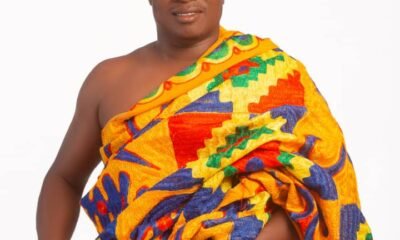
 News5 days ago
News5 days agoGodfred Agbeteti is best suited to lead Kpando Municipal Assembly – Assemblyman
-

 News1 week ago
News1 week agoDeclaration of Monday, 31st March 2025 and Tuesday, 1st April 2025 as Public Holidays
-

 News1 week ago
News1 week agoGEXIM CEO calls for accelerated empowerment of women in Agribusiness for Africa’s economic growth

